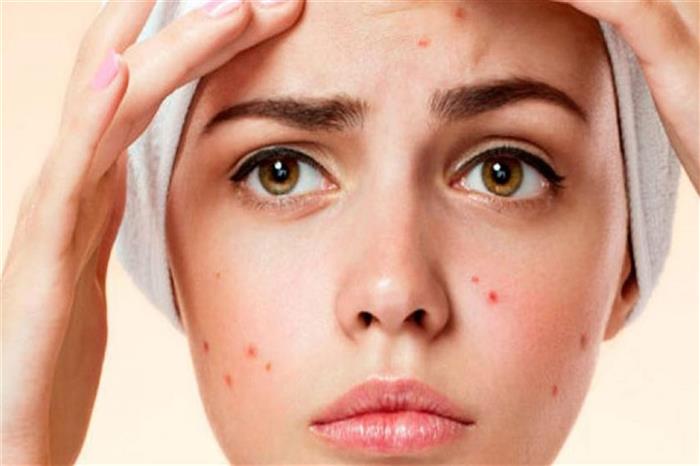Acne may threaten teenagers with suicide.. Here are the treatment methods.

Acne may threaten teenagers with suicide.. Here are the treatment methods.
- Article
- 5th March 2024
Acne is not limited to teenagers; it can appear in newborns, infants, children, and even people over the age of fifty. It can manifest at any age and is a common condition, affecting approximately 10% of the world's population at some point in their lives.
However, it is more prevalent among teenagers, with 85% of teenagers and young adults suffering from acne, hence the association of acne with youth
Causes of acne appearance:
Acne is part of the body's physiological process. During adolescence and puberty, hormone levels increase, leading to increased sebum production in the skin's oil glands. This excess oil clogs the pores and results in acne formation.
How to deal with acne:
Acne should be treated promptly to prevent scarring or indentations on the face. During adolescence, skincare is essential, including the use of a fruit acid-based cleanser once a day and moisturizing the skin with a water-based or gel moisturizer to avoid excess oil.
For individuals in their twenties and thirties, particularly those who use cosmetics, it is important to clean makeup brushes regularly, change pillowcases frequently, and use spot treatments for mild acne.
In the case of severe acne, it is advisable to consult a specialized doctor for diagnosis and treatment.
Why is it necessary to treat acne?
Although acne is a temporary condition that resolves on its own, doctors focus on its treatment to prevent any lasting effects. Acne can have a significant impact on a person's psychological well-being, particularly in teenagers. It is one of the top 5 dermatological conditions that affect a patient's quality of life, along with psoriasis, hidradenitis suppurativa, and eczema.
Acne negatively affects the quality of life by 40% in affected individuals, with depression and stress occurring in 30% of acne sufferers. Moreover, the suicide rate among teenagers with acne is 6 to 7%, highlighting the importance of treating acne.
Methods of acne treatment:
There are multiple treatment options for acne, which vary depending on its severity, the patient's age, and their psychological state.
For severe or scarring acne, oral treatments are recommended, including antibiotics, isotretinoin (a derivative of vitamin A), and hormonal therapies.
Isotretinoin is considered the most effective treatment for acne as it targets the underlying causes. It addresses inflammation, bacteria, sebum production, and reduces scarring. However, there have been rumors suggesting that it affects mental health due to increased vitamin A levels, potentially causing stress and depression. Nevertheless, scientific studies have not proven a direct link between isotretinoin and psychological effects. On the contrary, studies have shown that teenagers suffering from depression due to acne and considering suicide experienced symptom improvement with isotretinoin treatment, leading to an overall improvement in their well-being.
"Can natural remedies cause acne?
On social media, there are many home remedies for treating acne, but in most cases, they can actually cause acne. The skin has beneficial microbes called microbiota, which help maintain the skin's pH balance and act as a protective barrier. Disrupting these microbes can lead to an imbalance in skin acidity and trigger acne. Excessive skincare practices, such as using a cleanser excessively or using abrasive exfoliants and high doses of cosmetic products, can also irritate the skin and contribute to the development of acne.
Not all ingredients used in home remedies are harmful, but an overabundance of them can cause symptoms like contact allergies or irritation. However, if these ingredients are present in cosmetic products, they are usually present in specific concentrations that do not cause irritation.
For example, lemon is used for skin lightening because it contains lightening acids, but it can irritate and darken the skin, especially if used indiscriminately. Similarly, sugar scrubs, coffee, and yogurt containing lactic acid are not inherently bad as they have a scientific basis, but if not used correctly or in excess, they can have adverse effects.
Preventing acne:
As dermatologists, we recommend taking care of the skin with a simple and consistent skincare routine. It is important to follow a healthy lifestyle and consume nutritious food, as a high sugar intake can stimulate acne development. It is also essential to be mindful of activities that can cause acne. For instance, individuals who engage in sports should prioritize washing their face before and after exercise, as sweat can exacerbate acne.
For teenagers, washing the face and using treatments for mild blemishes that may appear is recommended. In their twenties, using sunscreen and maintaining continuous moisturization with a water-based moisturizer is important. In their thirties, incorporating vitamin A derivatives into the skincare routine is advised as they stimulate collagen production and protect against signs of aging."
